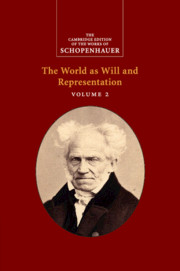Chapter 43 - The Heritability of Traits
Published online by Cambridge University Press: 30 June 2022
Summary
Daily experience teaches us that, with respect to bodily (objective, external) traits, the parents’ seeds brought together in procreation transmit not only the distinctive qualities of the species but also those of the individual, and in fact this has always been recognized:
Everyone follows the seeds of his own nature.
Catullus,Now whether this holds equally true of mental (subjective, internal) traits, so that these are also passed down from parents to children, is a frequently posed question and one that is almost always answered in the affirmative. A more difficult problem is whether we can separate the traits that come from the mother from those that come from the father, and hence what the mental inheritance from each parent might be. Now we can shed light on this problem with our fundamental recognition that the will is the essence in itself, the kernel, the root element of a human being; the intellect on the other hand is secondary, the thing added on, the accident to that substance; so before consulting experience, we would consider it at least probable that in procreation, the father, as the stronger sex and procreative principle, would provide the basis, the root element of the new life, which is to say the will, and the mother, as the inferior sex and merely receptive principle, would provide what is secondary, the intellect; and that therefore the human being inherits all moral features, character, inclinations, heart, from the father, while getting the degree, structure and direction of his intelligence from his mother. This assumption is actually confirmed by experience, only this cannot be decided by a physical experiment in a laboratory, but comes in part from many years of careful and subtle observation, and in part from history.
Personal experience has the advantage of complete certainty and specificity, and these outweigh the associated disadvantages of having a restricted sphere and using examples that are not generally familiar. In the first instance therefore I refer everyone to his own experience. To begin with, let him consider himself, admit his own inclinations and passions, his character flaws and weaknesses, his vices as well as his merits and virtues, if he has any: and then let him think back on his father, and no one will ever fail to notice those same personality features in his father as well.
- Type
- Chapter
- Information
- Schopenhauer: The World as Will and Representation , pp. 533 - 546Publisher: Cambridge University PressPrint publication year: 2018



